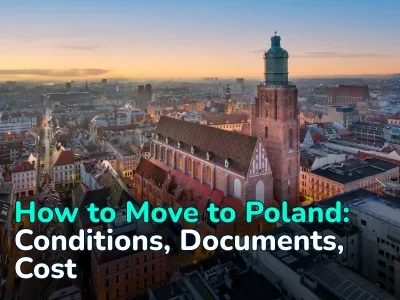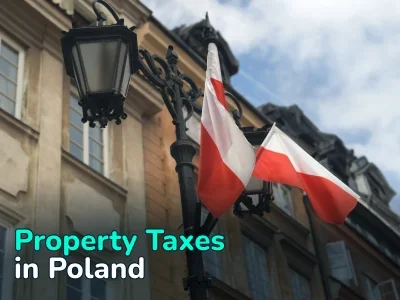
Mortgage for Property in Poland. How to Get a Loan for Foreigners
Poland has long attracted foreigners with its reputation as one of the most stable countries in Eastern Europe. However, buying property in Poland with a mortgage remains a challenge, not only for foreigners but also for locals. This is largely due to banks setting specific criteria for loan approval, which are often stricter for non-residents or those whose primary income comes from outside Poland.
In this article, we explore the nuances of the Polish mortgage system and highlight the key steps foreigners need to take to secure a home loan in Poland.
How to Get a Loan in Poland as a Foreigner
Polish banks cater to both EU citizens and nationals from non-EU countries. While the process is similar, EU citizens generally receive the same treatment as Polish citizens. Non-EU nationals, however, must demonstrate legal residency in Poland and provide proof of income earned within the country.
Banks offering loans for foreigners in Poland:
- PKO Bank Polski – one of the largest banks in Poland, offering loans to foreigners with various residency statuses.
- Santander Bank Polska focuses on foreigners working in Poland with documented income.
- ING Bank Śląski welcomes clients with steady income and employment contracts.
- Millennium Bank provides flexible options for those with temporary or permanent residence permits.
- Alior Bank is suitable for applicants earning income in Poland.
Key requirements:
- Residence permit. This is usually a mandatory requirement. Banks are more likely to approve loans for holders of long-term residence permits. EU citizens generally do not need a residence permit.
- Income verification. Regular income earned in Poland is essential. While some banks may accept foreign income, this comes with increased risk, stricter scrutiny, and conditions such as a higher down payment (up to 40–50%).
- Loan currency. Mortgages are typically issued in Polish zloty (PLN). Some banks may offer loans in the applicant’s income currency, but this adds currency exchange risk, which may affect loan terms.
Rejections are most commonly due to insufficient income, lack of an employment contract, or a short residency or work history in Poland. Difficulties in providing necessary documents, such as a residence permit or authorization to purchase property, may also result in denial.
What You Need to Get a Mortgage in Poland
The primary requirement for most banks is possession of a document confirming the legality of your stay in Poland. This can be a Temporary Residence Permit (Karta czasowego pobytu), valid for up to three years, or a Permanent Residence Permit (Karta stałego pobytu), which grants indefinite residence rights but requires renewal every ten years. When granting mortgages, banks prefer clients holding long-term residence permits.
It is possible to obtain a bank loan in Poland without a residence card through microfinance organizations (MFOs), which offer short-term loans to foreigners. These typically require a valid ID, a PESEL number, a Polish bank account, and proof of income or employment. However, obtaining large loans without a residence card is nearly impossible, especially when it comes to securing a mortgage for housing.
Foreigners can still access installment payment plans, for which the following documents are usually required:
- A passport with a valid visa,
- Proof of income,
- A PESEL number.
A second critical requirement for a mortgage is proof of stable income sufficient to service the loan. This is often evidenced by an income certificate for the past 3–6 months. Income can also be verified through:
- Employment contracts (Umowa o pracę). Banks favor applicants with contracts that do not have a defined end date.
- Civil-law contracts (Umowa zlecenie, Umowa o dzieło). These are less commonly accepted due to their temporary or one-time nature. Banks that do accept such contracts often impose additional conditions or require a higher down payment to mitigate risks.
- Self-employment. Income from entrepreneurial activities can also be considered, provided the business has been operating for 12–24 months and has no tax liabilities. Supporting documents required in this case include:
- Profit and loss statements for the past 1–2 years,
- Tax declarations proving payment of taxes,
- Bank statements demonstrating regular deposits into the business account.
Polish banks generally prefer borrowers with income earned within the country. However, some banks accept foreign income if:
- The income is earned in stable currencies, such as the Euro (EUR), US Dollar (USD), or British Pound (GBP).
- The applicant provides official documentation of income, such as tax declarations, employer certificates, or bank statements.
- The applicant has a positive credit history in the country where the income is earned.
While a positive credit history in Poland or another EU country is not mandatory for obtaining a mortgage, it increases the likelihood of approval. In the absence of a credit history, the bank may request additional guarantees to mitigate financial risks or require a higher down payment.

Permission to Purchase Real Estate in Poland
The purchase of real estate by foreigners in Poland is regulated by the Act of March 24, 1920, on the Acquisition of Real Estate by Foreigners. According to this law, in certain cases, foreign citizens are required to obtain permission from the Ministry of Interior and Administration (MSWiA) to purchase real estate.
The law mandates that foreign nationals who are not citizens of the European Union (EU) or the European Economic Area (EEA) must obtain permission when purchasing real estate in border zones. Additionally, all non-Polish citizens are required to obtain permission to purchase agricultural or forest land.
Cases when permission is not required:
- Purchasing apartments or individual residential units outside border zones.
- Purchasing Polish real estate by EU or EEA citizens, except for agricultural and forest lands.
- Acquiring property by foreigners who have resided in Poland for at least five years after obtaining permanent residence.
- Acquiring property by spouses married to Polish citizens, provided they have lived in Poland for at least two years after obtaining permanent residence, and the property will become joint marital property.
To apply for permission, a request must be submitted to the Ministry of Interior and Administration along with the following documents:
- Identification document,
- Information about the property,
- Documents proving the applicant's connection to Poland.
Upon payment of a state fee of PLN 1570, the application is reviewed by a commission, with a decision typically issued within a period of up to two months.
Purchasing real estate on credit in Poland without obtaining the required permission is illegal. Therefore, it is advisable to familiarize yourself with the requirements and understand the process of obtaining permission from the Ministry for real estate purchases in Poland. To streamline the process, you may seek assistance from consultants or legal experts.
Insurance
When applying for a mortgage in Poland, banks often require insurance for both the borrower and the property being mortgaged. Property insurance protects the asset against risks such as damage, destruction, or natural disasters (e.g., fire, flooding, or earthquakes). Typically, the insurance is taken out for either the loan amount or the full value of the property.
Life insurance for the borrower is particularly relevant for long-term loans or large mortgage amounts. This type of insurance ensures that in the event of the borrower’s loss of earning capacity, the debt is either repaid to the bank or the repayment responsibility is transferred to guarantors.
If a mortgage is granted without a down payment, banks usually require an extended insurance policy that covers additional risks. In many cases, the insurance policy can be arranged directly through the bank, although it is sometimes possible to use a trusted insurance company.
The annual cost is typically 0.03% to 0.1% of the property’s value. For example, for a property valued at PLN 400,000, the insurance policy would cost approximately PLN 120–400 per year. The cost depends on the borrower’s age, health condition, and loan amount. The rate generally ranges from 0.02% to 0.05% of the loan amount per month.
Features of a Home Loan with no Down Payment
Mortgages without a down payment are relatively rare in Poland, especially for foreigners. Typically, banks require borrowers to make a down payment of 10–20% of the property’s value. However, there are a few scenarios where both foreigners and Polish citizens may secure a mortgage without an upfront contribution:
- Government support programs. Programs like "First Home" (Pierwsze Mieszkanie) or other government initiatives aimed at supporting young families allow borrowers to obtain mortgages with minimal or no down payment. Foreigners can participate in such programs if they hold a residence card (Karta pobytu).
- Mortgages secured by other properties. If a borrower owns another property in Poland or abroad, it can be used as additional collateral instead of making a down payment. This option can help reduce or eliminate the need for an initial contribution.
- Additional Insurance. Some banks may waive the down payment requirement if the borrower takes out extended insurance or provides a bank guarantee. While this increases monthly payments, it allows the borrower to avoid a substantial upfront investment.
Currently, only a few banks in Poland, such as PKO Bank Polski or Santander Bank Polska, may offer reduced down payment requirements, if not a full waiver. These loans are typically granted to borrowers with high income levels and stable credit histories in both Poland and their country of origin.
For foreigners, holding a long-term residence card (Karta pobytu) — valid for 10 years — is often a prerequisite. Applicants with temporary residence permits face significantly lower chances of securing such loans.
While obtaining a mortgage without a down payment is possible, it remains a rare option and is often accompanied by stricter requirements or higher financial obligations.
Home Loan Amount and Interest Rates in Poland
The loan amount depends on the appraised value of the property, which is not always equal to and is often lower than the market price. Therefore, it’s not unusual for a loan offered by the bank, typically 70–80% of the property’s value, to be lower than expected.
Another crucial factor is the type of interest rate. A fixed rate remains unchanged for a specific period, usually 5–10 years, while a variable rate fluctuates based on market conditions. Fixed rates and long-term loans often reduce the amount a bank is willing to lend due to the increased risks.
Long-term employment contracts (umowa o pracę) significantly improve the chances of securing a loan. Civil-law contracts (umowa zlecenie, umowa o dzieło) are less favorable but may still be accepted.
As of November 2024, the average mortgage rate in Poland is 5–6% annually for fixed rates and 4–5% annually for variable rates. For foreigners, mortgage rates in Poland may be 0.5–1% higher, depending on the bank and individual terms.
Example of calculating mortgage for property in Poland:
- Property value: 500,000 PLN.
- Down payment: 20% (100,000 PLN).
- Loan amount: 400,000 PLN.
- Interest rate: 5% annually.
- Loan term: 25 years.
The monthly payment will be approximately 2338 PLN, with a total repayment amount over the term of around 701,400 PLN, of which 301,400 PLN will be interest.
Additional expenses:
- Bank commission. Usually 0–2% of the loan amount for processing and issuing the mortgage.
- Property appraisal. Appraiser services cost approximately 300–700 PLN, depending on the region and property type.
- Insurance. Mandatory property insurance against damage or destruction, costing around 300–500 PLN per year.
- Notary fees. Notarization of the purchase agreement, typically 1000–3000 PLN, depending on the property’s value.
- Land registry registration. Mortgage registration in the land registry (Księga Wieczysta) costs 200 PLN.
There are government programs available that allow mortgages in Poland with no down payment. These programs are primarily aimed at Polish citizens but are sometimes accessible to foreigners who hold long-term residence permits.
The First Home Program ("Pierwsze Mieszkanie") is designed to support first-time homebuyers. Includes the “Safe Loan 2%” scheme, offering a subsidized 2% interest rate for families and households. Applies only to the purchase of the first property and is not valid for subsequent purchases. Special Housing Account ("Specjalny Rachunek Mieszkaniowy") is a social program aimed at helping large families obtain housing loans or expand their living space.
Mortgage Calculator in Poland
Almost every major bank in Poland offers the option to estimate mortgage terms using an online calculator. These tools help assess the applicant’s financial capacity and calculate the required down payment, enabling comparisons of different banks' conditions without visiting their branches.
To calculate a mortgage in Poland, you need to provide details about the property value and the percentage of the down payment you plan to make. The calculator then automatically determines the difference between the property’s price and the down payment. The remaining amount can be distributed over a repayment period of 5 to 30 years, with either a fixed or variable interest rate, depending on the bank’s policy.
Official Bank Websites with Online Calculators:
- PKO Bank Polski.
- Santander Bank Polska.
- ING Bank Śląski.
- Alior bank.
Mortgage Costs
The primary expense when obtaining a mortgage for an apartment in Poland is the down payment. Banks generally require borrowers to pay 10–20% of the property's value, though the exact percentage can vary significantly due to the autonomy banks have in setting regulations, especially for foreigners.
The second-largest expense is the Civil Law Transaction Tax (PCC). Its rate depends on the status of the property. For purchases on the secondary market, the rate is 2% of the property’s value.
For properties on the primary market, the PCC is replaced by Value-Added Tax (VAT). The VAT rate for residential properties is:
- 8% for apartments with a floor area of up to 150 m² or houses up to 300 m².
- 23% for properties exceeding these limits or for commercial real estate.
Other expenses:
- Bank Commission for Loan Processing. Some banks charge a commission for reviewing and issuing a mortgage in Poland. This fee ranges from 0% to 2% of the loan amount, depending on the bank's specific terms.
- Property Appraisal. Properties purchased with a mortgage must undergo an appraisal in Poland. The cost of an appraiser's services typically ranges from 300 to 700 PLN, depending on the region and type of property.
- Notary Fees. The signing of the purchase agreement requires notarization. Notary fees depend on the property’s value and usually range from 1000 to 3000 PLN.
- Land Registry Registration (Księga Wieczysta). Registering a mortgage in the land registry costs 200 PLN. Changes, such as transferring ownership, cost an additional 150 to 300 PLN.
- Additional Expenses. Legal services from a company or individual lawyer for document verification cost between 500 and 2000 PLN. Real estate agency fees generally range from 2% to 5% of the property’s value.
Overall, the requirements for obtaining a mortgage in Poland for foreigners are less stringent than in Germany or Spain. However, the home loan interest rates in Poland are often higher, both for fixed and variable rate loans.
In this regard, Poland offers a relatively optimal mortgage solution. For instance, in Germany, additional costs (e.g., taxes, fees) amount to 9–18% of the property’s value. In Spain, banks typically finance only 50–70% of the property’s value, requiring a significantly larger upfront contribution.
Polish Mortgage Application Process
Before getting a mortgage in Poland, it is essential to prepare in three key areas: selecting a suitable property, gathering documents to prove income, and saving for the down payment. Additionally, a positive credit score in Poland over a significant period can improve your chances of approval.
To estimate the down payment amount and subsequent payments, you can use online calculators available on the websites of most major banks offering mortgage services.
The list of necessary documents may vary by bank but generally includes:
- Passport and residence permit (temporary or permanent),
- Proof of income (e.g., employer income statement or tax return),
- Employment contract (Umowa o pracę, Umowa zlecenie, or Umowa o dzieło),
- Bank statements for the last 6–12 months,
- Preliminary purchase agreement for the property.
Key steps in the mortgage process:
- Submitting the application. Applicants provide the complete set of documents to the chosen bank. The bank reviews your credit history, analyzes financial stability (income, job security, current obligations), and, if satisfactory, commissions an independent property appraisal to determine its market value. The mortgage amount is calculated based on this valuation.
- Preliminary approval. After reviewing the application, the bank issues a preliminary decision, confirming its readiness to grant a loan. At this stage, the bank specifies the loan amount and terms.
- Signing the purchase agreement. If the terms and loan amount are acceptable, applicants can use the bank's preliminary approval to sign a purchase agreement with the property owner.
- Signing the loan agreement. Next, applicants finalize the credit agreement with the bank. The document includes all key terms, such as the interest rate, monthly payment amount, and repayment period.
- Registering the mortgage. After signing the loan agreement, the bank transfers the funds to the seller's account. The borrower registers the mortgage in the land and mortgage register (księga wieczysta).
Once the mortgage process is complete, the borrower gains ownership of the property and assumes the debt obligations, starting monthly repayments. Failure to make payments can result in financial and legal consequences:
- Penalties and late fees. Immediately after a missed payment, the bank or lender starts accruing penalties. These usually amount to a percentage of the overdue sum per month.
- Credit history impact. Non-payment is recorded in the Credit Information Bureau (BIK), Poland’s primary credit history database, and lowers the borrower’s financial rating for future loans.
- Debt collection. If the debt continues to grow, the bank may transfer it to a collection agency. While collection agents may remind you to pay, they cannot confiscate your property without a court order.
If the debt for Poland's mortgage for foreigners remains unresolved, the bank may pursue legal action. Upon reviewing the case, the court often sides with the bank and issues an enforcement order. This allows the matter to be passed to a court-appointed enforcement officer (komornik), who may:
- Freeze the debtor’s bank accounts,
- Seize assets, such as vehicles or valuable items,
- Deduct up to 50% of the debtor’s salary if they are officially employed in Poland.
For foreigners without a residence card, the situation can become more complicated. The debt may be transferred to international collection agencies, resulting in enforcement actions even outside Poland. Additionally, outstanding debts can impact visa or residence permit applications if the bank notifies immigration authorities about unpaid financial obligations.
Author
I write informative articles about real estate, investments, job opportunities, taxes, etc.























